How can pastors, churches care for people's souls in post-pandemic world?

The Church is facing a new reality in light of the pandemic and it's time for pastors and leaders to shift their thinking about caring for people's souls, some Christian leaders say.
In a Barna group webcast Wednesday called "State of the Church: Caring for Souls in a New Reality," North Park University professor Soong-Chan Rah, pastor John Mark Comer from Portland, Oregon, and leadership coach and author Jo Saxton offered that the global public health crisis, though devastating, can be a gift to the Church.
"I think anytime we have a crisis, anytime there's a kind of disruption in the status quo, it's a great way to examine the changes that have occurred that have been there under the surface all this time, but we just haven't noticed it because we are so used to the status quo," Rah said in the four-way interview hosted by Gordon-Conwell Theological Seminary's Nicole Martin.
"I think part of the benefit of a crisis is that it reveals the flaws and the weaknesses that we've tolerated over the years. We've allowed these flaws and weaknesses to scar over and we've ignored some of the pain that's underneath the surface, and we've gone along on our merry way. But once a crisis like COVID-19 hits, we're actually forced to confront some of these challenges that we've allowed to fester for many, many years."
Saxton added that what has given her hope is that the Church has always needed to be present for people in their online lives and the coronavirus has forced the Church to adapt, be creative, and reach people where they are more intentionally.
Comer said he believes many people are rethinking their life, lifestyle, and life values. His experience, he said, has been with many "de-churched" people who are joining online gatherings and reconsidering God, faith, and their mortality.
"You can't hide, like most Western people do, from the fact that we are mortal creatures and we will die and it may happen way sooner than any of us planned," he said.
Asked to elaborate on spiritual formation and how discipleship is occurring in a hyper-digitalized context, Saxton said it's crucial to remember what discipleship actually is — and that it's not just having all the right information.
"Discipleship isn't just purely about teaching, [though] it's an integral part of it. But when we look at how Jesus made disciples, He gathered a few, gave them access to His life, they could see how He was doing this life and then He gave them the opportunity to put it into practice," she added.
Thus, the Church has an opportunity in this moment to do likewise, she said.
The internet is a great means of delivery for new ideas and mental maps by which to navigate reality, Comer said, "but then people have to take it and habituate it into their body at a cellular level."
"And that's done best in silence and solitude and in deep personal relationships. And this is a great time for most of us for quiet, introspective soul formational work, journaling, sitting with God, and Sabbath. Rest," Comer added.
Before the pandemic, a typical measure of success was baptisms or weekly church attendance. But the concept of success in ministry is shifting, the leaders observed, and it might take a while to adjust to the new paradigm.
"The new metrics that we will need is going back to the depth of discipleship. How are people transformed during this? People always adapt in one form or another. Churches will figure out a way to get their services online. Churches will definitely figure out a way to collect offerings. Churches will figure all of this stuff out. It's not so much are the metrics [of success] changing, but what is the value system behind those metrics, and can those be transformed?" Rah said.
Saxton said the Church might have to have a season of getting acclimated to the discomfort of not knowing what "success" looks like and that's actually not a bad thing. She's been observing how people are engaging online — both unchurched and Christians — and noted a "surge" in spiritual hunger in parts of the world.
Rah counseled pastors that, in keeping with Scripture, whatever you have done to the least of brothers and sisters you have done to Jesus, and in crises that should be taken most seriously.
"We are not here at this moment to grab more power or to grab more attention in a negative way. We are not here in this moment to stroke our egos so we can feel good about having 3,000 people in our church services again,' he said.
"We're here to show the greatest amount of love, mercy, justice, and compassion to the very least of our brothers and sisters," he stressed.
Comer admitted that he faces a daily urge to overreact to save his church from a "perceived doom" in light of the uncertain circumstances.
"And for me, not meeting on Sundays or not rushing out and filling the void with new podcasts or initiatives or programs, some of which have their place, is really the greatest act of trusting God," he said.
"Can I trust that God will care for our church even if we can't have regular gatherings for a year or two? When I don't trust that I click over into frenetic overactivity. But when I can really trust in His care for us through this? What if I could just accept the reality of winter and not fight it but make peace with it and even find a deep joy and contentment in it?"




























